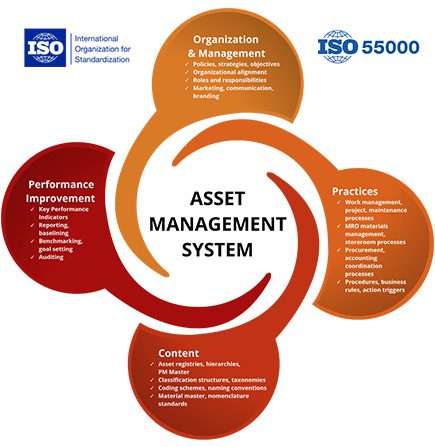Asset Performance Management Foundation Course Provides guidelines on how to manage the vital balancing principles in any asset intensive business.

What is Modern Physical Asset Management?
Asset Management is all about managing assets, asset portfolios, asset systems and integrated management systems. The key consideration in asset management is that assets should be managed across the life cycle perspective (cradle to grave); which means planning, purchasing, construction, acquiring, using, operating, modifying, dismantling and disposing. The standards provide guideline on how to manage the vital balancing principles in any asset intensive business i.e. to manage Costs, Risks & Opportunities, and Performance. ISO 55001:2014 is the most widely acceptable international standard that is currently in practice globally in Oil & Gas, Utilities, Manufacturing, Ports, Terminals, Rail, Hospitals, Defense and other Infrastructure sectors.
Course Description
The Asset Performance Management course is a foundation level course designed to bring maintenance practitioners to a common level of understanding with regard to the main terms and concepts underpinning Asset Reliability and world class Asset Performance Management. The participants will explore how the concepts and strategies can be used to maximize their experience and build strong bases from which the organization’s Asset Management and Maintenance strategies will continue to evolve. The course will consist of a series of lectures followed by workshops where participants will either get involved in exercises designed to explore the concepts discussed or reflect on how the concepts could be applied in their workplace.
The participants are expected to gain a foundational knowledge of the principles behind asset management, the different maintenance strategies that can deployed to improve asset reliability and most importantly a vision of what world class asset performance looks like and how they can better help participants achieve their Reliability goals and targets.
Course Objectives
- ANALYSE the fundamental concepts of modern Physical Asset Management
- LEARN how to develop and align the business strategy with the asset management strategy
- IMPLEMENT best practices for the physical asset management
- UNDERSTAND the concepts of conflicting drivers in the asset management; risk, cost and performance management
- COMPLETE a small gap assessment exercise and benchmark your asset management practices with international standards.
- NETWORK with a variety of influential personnel
Course Outline
|
DAY |
SESSION |
TOPIC |
|
1 |
Morning |
Asset Management Overview |
|
Asset Life Cycle Definition |
||
|
Activity 1: |
||
|
Risk Based Management |
||
|
Activity 2 |
||
|
Afternoon |
Managing Risk: Asset Criticality |
|
|
Activity 3 |
||
|
Managing Risk: Understanding Failure
|
||
|
Activity 4 |
||
|
2 |
Morning |
Condition Assessment |
|
Activity 1 |
||
|
Asset Management Strategy |
||
|
Activity 2 |
||
|
Afternoon |
Understanding and Applying Maintenance Strategies |
|
|
Activity 3 |
||
|
Understanding and Applying Maintenance Strategies (Continued)
|
||
|
Activity 4 |
||
|
Maintenance Records |
||
|
Maintenance Metrics |
||
|
3 |
Morning |
Managing Consumables and Spares |
|
Activity 1 |
||
|
Managing Service Provider Performance |
||
|
Analysis Tools and their value to the RCM Team |
||
|
Activity 2 |
||
|
Finance 101: Whole Life Cost Terms and Acronyms |
||
|
Asset Life Cycle Cost and how the RCM team can positively impact it |
||
|
Afternoon |
Activity 3 |
|
|
The Road to Asset Performance |
||
|
OPTIONAL¹: The APRI Asset Performance Management Road Journey & Road Map |
||
|
OPTIONAL²: The Roles and Responsibilities of the RCM in the APM Journey |
||
|
Activity 4 |
Who Should Attend
The course is intended for Managers, Engineers, Asset Owners such as
- Maintenance & Reliability Engineers
- Maintenance Managers
- Asset & Operations Managers
- Business Professional
- Quality Management Professionals
- AMS/IMS Auditors
- Accountants
Industry
- Oil & Gas, Petrochemicals & Refineries
- Power, Utilities & Nuclear
- Hospitals, Public Offices
- Rail, Defense, Military, Terminals, Ports…
